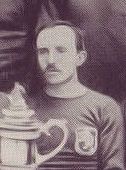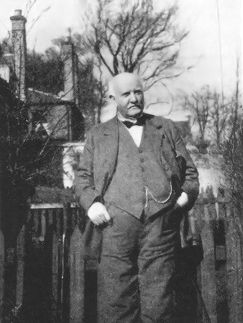John Ferguson

Johnny Ferguson was without doubt the World's first, working-class footballing star and also the source of the Scottish game's first, major controversy. A fine athlete as well as shinty player he had well before football already won prizes for his rapid running and those prizes had been at times monetary. There is no evidence that the prizes had been won after he had, having been born in 1848, taken to football from 1872 and already at the age of twenty-four with evident alacrity and success. But his past was used by others in the first Scottish Cup in 1873 as a reason to object to his participation. The result was that the whole Vale of Leven team chose to scratch that year, thenrefused to take part the following ones until in 1875 a "solution" was found. Yet it did not stop Johnny in the middle of the stoochie in 1874 being selected for his first Scottish cap. Perhaps the international rules were different!!
Johnny Ferguson's birth seems to have been on the Bonhill-Jamestown border, just, the youngest of ten children. His parents were both Perthshire Highlanders, his father, Donald, a Labourer, born in Killien, and his mother, Christian, born in Rob Roy's home village of Balquhiddder. The couple were married there too and the first six of their children were Perthshire-born. It suggests the family only arrived in the Vale of Leven, settling in Jamestown between Bonhill and Balloch in about 1840. They were new-comers.
At twelve the young Johnny was already a tea-boy in the print-fields, in his case calico. A decade later and having lost his father, he was a Printfield Worker and a decade later still he was an equally humble Yarn Dresser. By then and living actually in Jamestown he had married, in 1874 to Balloch-girl, Mary McKinnon. They were to have six children, three girls and three boys. And it was during this period that John's footballing career as a flying, goal-scoring winger, left- or right-, blossomed. He played in the Vale team from its onset in 1872/3 until 1880, featuring in all three Scottish Cup Final wins in the period, then may have taken a break, might have been there in 1884 Final, had it been played, and was back for the replayed but finally lost final of 1885, seemingly at the age of thirty-six. And between 1874 and 1878 he also won six Scottish caps, scoring five times.

It seems then on eventual footballing retirement life took a different turn, although he would still maintain close contact with the club, of and for which he had been founder and player. By 1901 he and the family had moved to Kilmarnock, from the Leven to the Irvine, perhaps with an invitation to coach the town team. There he went fully into the wine and spirits trade as a publican/merchant, with on his death, aged eighty-one, a business, it is said, in Prestwick and seemingly still premises in Robertson Place right in the centre of Killy, a short distance from what had become his home for almost thirty years. By then in 1929 he was a widower, Mary having passed away in the Ayrshire town in 1922 at the age of sixty-seven.
Birth Locator:
1848 - Jamestown/Bonhill Dunbartonshire
Residence Locations:
1851 - Mclean's Land, Jamestown/Bonhill, Dunbartonshire
1861 - Mclean's Land, Jamestown/Bonhill, Dunbartonshire
1871 - McKean's (perhaps McLean's) Land, Jamestown/Bonhill, Dunbartonshire
1874 - Jamestown, Dunbartonshire
1881 - Main Road (St.), Graham's Park, Bonhill, Dunbartonshire
1891 - 331, Main St., Bonhill, Dunbartonshire
1901-29 - 32, Glebe Road, Kilmarnock
Death Locator:
1929 - 32, Glebe Road, Kilmarnock
Burial Locator:
Kilmarnock Cemetery, Kilmarnock
Back to Alexandria and Bonhill,
or the SFHG Home page